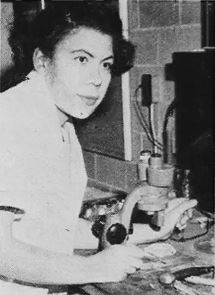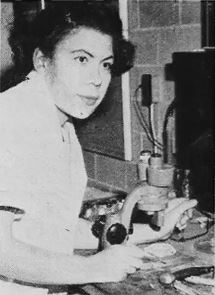

Margaret James Strickland Collins (September 4, 1922 – April 27, 1996) was an African-American child prodigy, entomologist (zoologist) specializing in the study of termites, and a civil rights advocate. A sci-fi story by S.F. Light — about a man shrunk down to the size of an ant — inspired Margaret to pursue science. As a field biologist, she kicked down barriers left and right by traveling to Guyana to conduct research, teaching at colleges and universities, and even discovering a new species of termite. In her own words: “I’m a field scientist. When I started, field biology was not considered a women’s work. But gender is incidental if a scientist is good.” Collins was responsible, together with her colleague David Nickle, for identifying a new species, the Neotermes luykxi (the Florida dampwood termite).
Collins was born in 1922 in Institute, West Virginia. She started college at age fourteen and earned a Bachelor of Science degree in biology from West Virginia State University in 1943. She earned a Doctor of Philosophy degree from the University of Chicago in 1950, becoming only the third Black woman zoologist in the country.Her dissertation was Difference in toleration of drying between species of termites (Reticulitermes) with an article based on this work in Ecology, the journal of the Ecological Society of America.
Collins taught at Florida A&M University and at Howard University. She saw herself primarily as a field scientist, and did extensive field work in North and South America, specializing in the insects of Guyana and Florida. From the late 1970s through 1996, Collins was a research associate in the Smithsonian’s National Museum of Natural History,Department of Entomology. Her primary area of study was termites of the Caribbean.
Her life’s research regarding termites included: the evolution of desiccation resistance in termites; various termite species’ tolerance of high temperatures; defensive behavior in South American termites, including chemical defenses; termite ecology; species abundance in virgin and disturbed tropical rain forests; and behavioral ecology, taxonomy, and entomology.
She was also an active civil rights advocate, receiving a bomb threat for planning to give a university talk on biology and equality, and being followed by police and FBI when she was a volunteer driver during a bus boycott. Collins was still doing research when she died at age 73 on April 27, 1996 in the Cayman Islands. She died of heart failure, and, as she had hoped to, while on a field trip.
Known as the “Termite Lady” for her expertise in the field, she had just finished a short course book entitled “Biology of the Caribbean Termites.” She also wrote “Science and the Question of Human Equality” and had appeared on television in educational programs. Her research findings on termites have been published in scientific journals.
